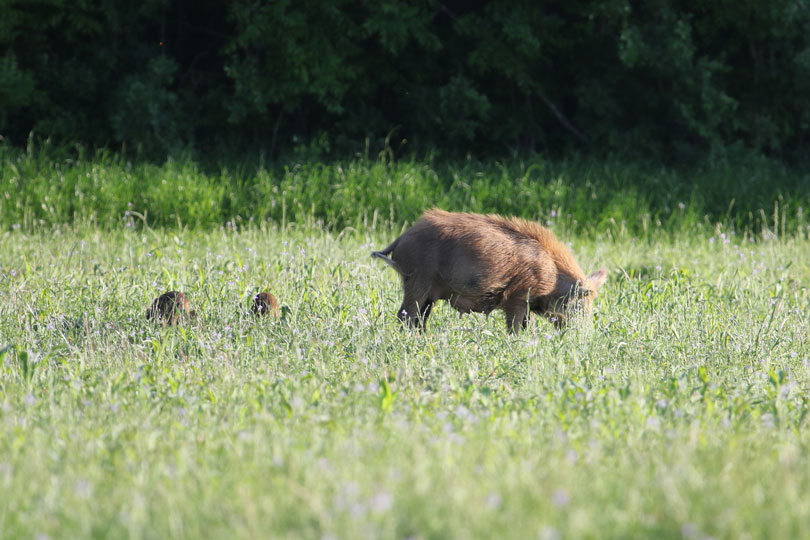By Jennifer Whitlock
Field Editor
Devastation of the American pork industry—and a lack of retail availability—is a likely outcome if African swine fever (ASF) were introduced into the U.S.
Although there is no sign yet of ASF in the continental U.S., a positive case was reported in Haiti on Sept. 20, bringing the disease closer to America.
The sample, collected from a pig in a Haitian province bordering the Dominican Republic, was tested by the U.S. Department of Agriculture’s (USDA’s) National Veterinary Services Laboratories.
“While unfortunate, this detection is not unexpected due to the recent cases of ASF in the Dominican Republic,” USDA said in a statement confirming the finding. “USDA’s Animal and Plant Health Inspection Service (APHIS) is committed to assisting both Haiti and the Dominican Republic in dealing with ASF and continues to consult with animal health officials in both countries to support response and mitigation measures.”
Importation of pork and pork products from Haiti and the Dominican Republic are currently prohibited.
APHIS also increased surveillance and safeguards in U.S. territories. A federal order suspending the interstate movement of live swine, swine germplasm, swine products and swine byproducts from Puerto Rico and the U.S. Virgin Islands to the mainland U.S. will remain in effect until APHIS can establish sufficient mitigations to authorize such movements.
“USDA is taking these actions out of an abundance of caution to further safeguard the U.S. swine herd and protect the interests and livelihoods of U.S. pork producers,” the agency stated.
Although the disease is harmless to humans, the nation’s unchecked feral hog population could become a reservoir for the deadly animal infection, threatening the health of domestic hogs and suspending pork exports for years—maybe even decades.
But USDA is aware of those risks and does have contingency plans in place, APHIS Wildlife Services (WS) Deputy Administrator Janet Bucknall said in a Sept. 17 webinar during what the agency called “African Swine Fever Action Week.”
That’s because APHIS already had programs in place to deal with the invasive species that can be retrofitted to help in the early detection of ASF among feral hogs, according to Dr. Vienna Brown, WS National Feral Swine Program biologist.
“We already have the National Forestland Damage Management Program, so in terms of removing feral swine and conducting surveillance work, we are utilizing that framework to prepare for ASF,” she said. “And in 2019, we rolled out morbidity and mortality surveillance for ASF in partnership with our state and federal partners.”
Any feral hog that is sick or dead without apparent cause are reported to APHIS, which tests the samples for classical swine fever and ASF.
There is already a congressional mandate to collect a minimum of 2,800 samples from feral swine each year to test for other diseases, Brown noted, so adding ASF testing to the list just made sense.
In the past two-and-a-half years, she said the agency has tested 23 animals that met the criteria for ASF investigation, all of which were found negative.
But if a feral hog is ever confirmed positive for ASF, USDA would set up an infection zone, buffer zone and surveillance zone around where the animal was found within 72 hours.
The infection zone was created to be about two to three times the average range of a wild hog. Contact between pigs more than two kilometers apart is unlikely, said APHIS WS National Wildlife Research Center Biologist Sarah Bevins.
Inside that zone, USDA would immediately begin culling all swine to prevent further spread of the disease. A same-sized zone would apply for any detection of ASF in domestic pigs, as well.
Various other agencies under the USDA and APHIS umbrellas, as well as state programs, are poised to work together if there is an ASF outbreak in feral hogs in the U.S., Dr. Julianna Lenoch, WS National Wildlife Disease Program veterinary epidemiologist, added.
“There’s a lot of collaboration, a lot of communication that’s necessary and very valuable to us as we continue to work on our preparedness activities and to be prepared for the possibility of an ASF response,” Lenoch said.
To watch the webinar in its entirety, click here. Four other webinars recorded during APHIS’ ASF Action Week are also available online.
Click here to learn more about ASF.


If the government had done what it should have 20+ years ago, and eliminated the feral hog, we would not be worrying about the ASF spreading as rapidly!! All we ranchers and farmers have heard for the last few years is that ‘a plan is being developed for their irradiation’ or ‘the government is going to authorize the use of KAPUT, which sterilizes’ or (Heaven forbid), or the government is going to put a bounty on the feral hogs.